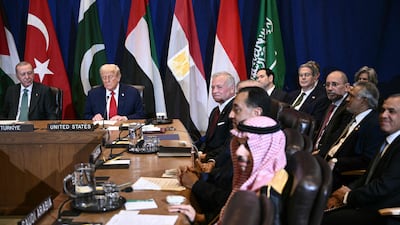Most Arab states, especially in the Gulf, have shifted from passive diplomacy conducted behind closed doors to assertive diplomacy, with declared goals rooted in national interest, regional stability and a recalibrated role in the emerging global balance of power.
A critical new chapter is thus being written in their visionary political approach, which has placed economic development, scientific innovation, technological advancement and artificial intelligence at the core of national strategy. Simultaneously, they have worked to block the path for obstructionist projects promoted from inside Israel and Iran that seek to sabotage progress.
What has prevailed is political realism focused on defending national and Palestinian interests. This is in large part due to the partnership between US President Donald Trump and senior Arab and Islamic leaders in their bid to topple destructive ideological frameworks.
One of those frameworks involves the current Israeli government’s doctrine of building a Jewish state by ethnically cleansing its territory and the occupied Palestinian lands through displacement and settlement.
Mr Trump reversed his initial endorsement of Israeli expansionism after hearing, unequivocally, from Arab and Islamic leaders about their readiness for peace and normalisation on the condition that Israel halts its dangerous trajectory.
The second framework is the one pushed forth by the Iranian establishment and involves establishing regional hegemony by building a so-called Axis of Resistance as well as nuclear and ballistic missile arsenals.
The “Persian Crescent”, or “Shiite Crescent”, effectively collapsed when Iran’s Islamic Revolutionary Guard Corps was pushed out of Syria, and Israel dismantled Iran’s most powerful arm, Hezbollah, in Lebanon. Supply lines have been severed. Iran’s leadership is now caught between denial and deep concern over the potential for domestic upheaval.
Mr Trump showed wisdom by inviting Iran to join the peace track set out in the “Trump Plan” for the Middle East. In doing so, he put before the Iranian establishment a choice between peace and submission, as the US, Europe, Israel and others will not tolerate a nuclear-armed regime.
If Iran’s leaders choose to continue buying time and manoeuvring with tactics to avoid both peace and compromise, they will find themselves entangled in their own failing, self-destructive doctrine both domestically and regionally.
A third failed doctrine is pan-Arabism, which the Arab left used for decades to manipulate the Palestinian cause for its own ends. Much of the Arab left granted itself moral licence to outbid everyone else on Palestine, in empty rhetoric and self-righteousness. But the era of Arab generations being held hostage to false promises and wasted dreams is over.
We are now witnessing a new Arab generation that seeks to join the world of technology and AI. It demands the right to growth and access to its countries’ resources. This generation will no longer tolerate the ways of the past and those who came before.
But this is also a generation that will not tolerate injustice anywhere. It did not remain silent in the face of Israel’s egregious violations in Gaza. This is a generation that has morally challenged Israel.
Today, Israel is scrambling to repair its tarnished identity. If it wishes to restore its reputation, it must commit sincerely to the two-state solution and to justice for Palestinians. Otherwise, it faces inevitable self-destruction.
As for Hamas, its story has ended even if its leaders are scattered, awaiting a regrouping under the dream of the Muslim Brotherhood to seize power across the Arab world.
The group is the ultimate loser, and it won’t any longer be tolerated by Israel as a tool to dismantle the Palestinian Authority. That authority was a principal architect of the 1993 Oslo Accords, which established Palestinian self-rule in the West Bank and Gaza. Israel begrudgingly accepted Oslo, thinking of it as a passing fad, while Palestinians embraced it as a strategy of presence on their land, rather than perpetual exile.
PA President Mahmoud Abbas rejected the militarisation of any intifada because he understood that Israel’s real aim was extermination. But Hamas betrayed Palestinians both during its rise and then during its downfall, as its hollow ideology and destructive tactics brought death, hunger and ruin to Gaza.
So where will it go now? One can only hope that those who backed the group do not plan to redirect it towards Syria or Lebanon. Preventing such a scenario is as much a US responsibility as it is a regional one. Breaking the promise of peace under the guise of surrender must not be allowed.
Mr Trump is expected to visit Egypt at the start of this week to launch the train of peace in a new Middle East rooted in strategic security, and political and economic co-operation with Arab countries and Turkey, alongside the fundamental US-Israel alliance.
The US President deserves recognition and encouragement for his efforts in the region. He has delivered on ending the Gaza war and halting Israel’s project, in exchange for a regional commitment to dismantle Hamas and bury the doctrine of armed resistance, replacing it with readiness for peaceful co-existence with Israel.
However, the likes of Israel and Iran should beware of trying to undermine these efforts because Mr Trump knows how to retaliate, and he has the tools to do so.


